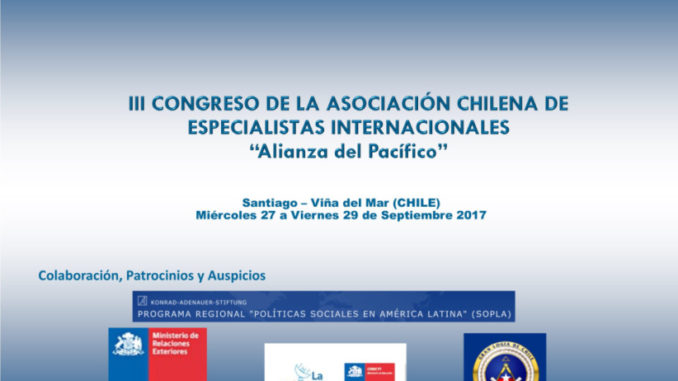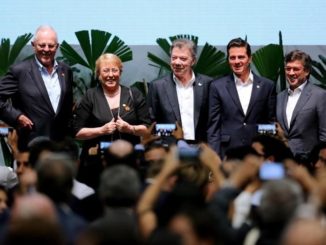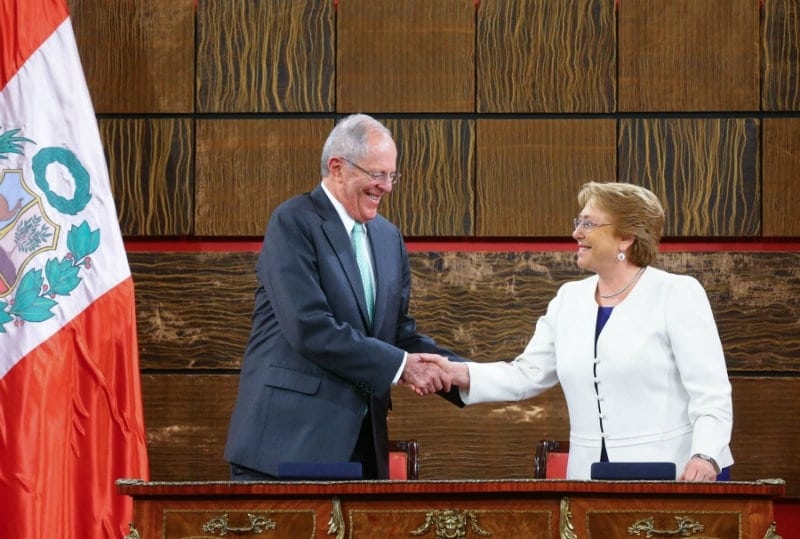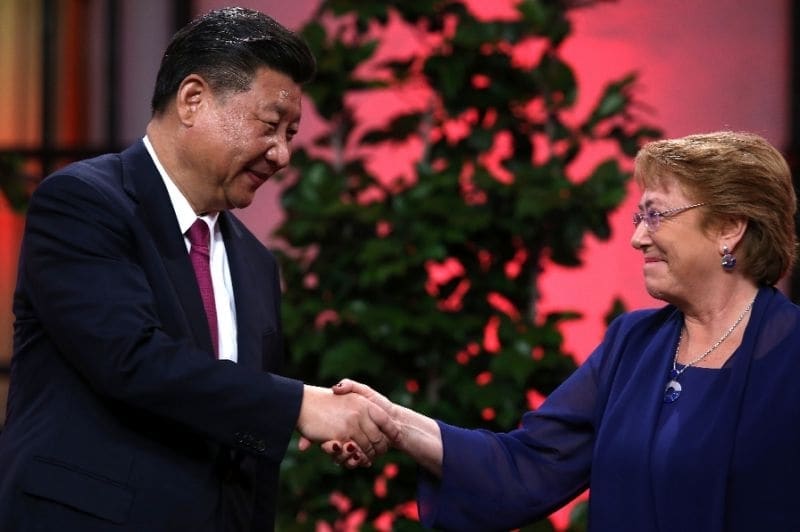
The Chilean Association of International Specialists (ACHEI) held its III. Congress in Santiago and Viña del Mar from 27 – 29 September. Numerous experts discussed the ‘Pacific Alliance,’ which aims to deepen relations among Pacific countries.
The event opened in the Ministry of Foreign Affairs in Santiago with the first panel analysing the current realities of the international system. Christian Rieck, professor at Berlin’s Humboldt University, explained that the Pacific Alliance is also an expression of new global power relations. Europe follows curiously and with optimism the swing towards Asia, because it supports economic integration and defies nationalism. Still, the Alliance must avoid the impression of being a neoliberal project as that could erode its legitimacy in an ideologically diverse region such as Latin America. Europe, Professor Rieck maintained, favours the Pacific Alliance not least because it stalls the influence of ALBA countries which promote the Bolivarian Revolution. Subsequently, Alberto Sepúlveda of ACHEI challenged Professor Rieck’s call for further institutionalisation of the Alliance. Mr Sepúlveda explained that cultural differences and, above all, lamentable general unawareness of member countries’ foreign relations thwart such aspirations. Moreover, leading countries like Chile flatly reject supranational institutions, for reasons Europe seems oblivious to. Closing with a bold and optimistic forecast, Mr Sepúlveda argued that the appearance of Latin-American capital in the last three decades fomented regional autonomy and wealth creation, and if that development continues, Latin America would overtake Europe one day.
The second panel analysed how current US politics relate to the Pacific Alliance. ACHEI’s vice-president Jaime Sepúlveda Cox explained that although US hyper power foreclosed any alliance options for Latin-American states, Washington also promoted democracy, peaceful conflict resolution, and cooperation. The September 11 attacks, however, caused a rupture and US foreign policy turned toward the Middle East. ALBA countries took advantage of this scenario to explicitly challenge US influence, whereas the US’s closest allies in the region founded the Pacific Alliance which acts less confrontational but nonetheless aims to increase autonomy. In that endeavour Latin America can count on considerable soft power, as in sports for example, as Raul Allard Neumann, director of ACHEI, argued. He also warned that further institutionalisation of the Community of Latin American and Caribbean States (CELAC) could provoke its implosion over sharpening differences among members. Finally, private sector representative, Jorge Daccarett Bahna, underscoring the strong business drive in the region, remarked: “Like water, business can’t be stopped; it’ll always find a way.” He recommended Pacific Alliance countries should open the door for Washington but move on if it hesitates.
The third panel considered the global economic environment and implications for the Pacific Alliance. ACHEI’s director Christian Torres Miranda kicked off the discussion by articulating Chile hopes to unite South America, and highlighted China role in saving the global economy as the 2008 crisis unfolded. Cristóbal Ramírez, of the General Directorate for Economic International Relations (DIRECON), expounded on the success of the Pacific Alliance, which exceeded its initial objective of accommodating socio-cultural exchange by completing 33 projects with 16 countries. The private sector has been integral to this success, Mr Ramírz maintained, as DIRECON has consistently sought and implemented the input of the business community. Subsequently, José Luis Parra, Director of the Pacific Alliance Observatory, claimed that the concept of ‘bloc’ doesn’t characterise the Pacific Alliance adequately, because it actually constitutes a political-economic integration and cooperation project. He raised concerns about Colombia’s and Peru’s fall in the 2017 global competitive index, which needs to be rectified fast if the Alliance is to advance. Mr Parra also mentioned the problems in the Chinese financial system, with the potential to derail cross-Pacific integration. Yet, he remained optimistic explaining that the Pacific Alliance is robustly built — it just needs to be utilised fully.
During the fourth panel, professor Alvaro Fischer, of the Human Behavior and Evolution Society, talked about Chile’s fortune of possessing two natural laboratories, the Atacama Desert and Antarctica. Chile’s southernmost part could serve as a ‘door to Antarctica’ due to its proximity to the icy continent. That geography will benefit especially the city of Punta Arenas and help turning it into a global science hub. Next, professor of journalism Juan Roldán Gómez, pointed out that academic integration advances well as foreign students increasing arrive from Pacific Alliance countries. Chilean universities, however, should not squander related opportunities with their commercialism, as their preference for associating with globally high-ranking universities often ignores opportunities regional universities offer.
The second day of the conference analysed national security issues and took place in the Chilean Naval War College in Viña del Mar. Argentine expert, professor Mariano Bartolomé expounded on Latin America’s two faces: democratic stability (except Cuba and Venezuela) on one side, and harrowing crime on the other. The latter stems largely from the ‘five wars of globalisation,’ specifically drugs, arms, and people trafficking, intellectual property theft and money laundering. Afterward, former Chilean Defence Minister, Jaime Ravinet de la Fuente, warned that the Trump presidency, North Korea’s ambitions, China’s expansion and ISIS could culminate in major conflicts. He also argued that regional integration will stall until all countries satisfactorily define their borders.
The following panel discussed the challenges Antarctica poses. Ex-commander in chief of the navy, Miguel Vergara Villalobos, maintained that despite challenges, progress has been made in the tender process for constructing the infrastructure necessary to create an Antarctic studies center, and former ambassador Samuel Férnandez Illanes emphasised that the Antarctic Treaty has largely balanced particular interests of all parties involved, constituting a success for the international community.
Day three of the conference put Asia in the spotlight. Chihon Ley Neira’s presentation emphasised that in Latin America three visions of China — associative, defensive, and ideological — determine engagement. Moreover, although China recognises and accepts enduring US influence in the region, it nonetheless exploits any power gaps that open up. He warned that Chile’s dependence on both the US and the Chinese markets would spell trouble if relations between the two giants deteriorate, especially since the development of both Chile and China is interlocked. Former ambassador to China, Fernando Reyes Matta, explained that China’s increasingly proactive behaviour on the world stage suggests Deng Xiaoping’s dictum of moving in the shadows doesn’t hold anymore and China thus apparently modernised its foreign relations.
In the closing session, Chile’s undersecretary of foreign affairs, Edgardo Riveros Marin, sustained that Trump, climate change and migration pose incredible global challenges, but that Chile’s role in blocs such as the Pacific Alliance position the country well to tackle all of them. Mexican representative Rafael Velázquez Flores expressed concerns over the rising racism and xenophobia in the international system, but deeper economic integration would help counter such tendencies and create greater autonomy. Crucially, integration must serve the people, not a state or particular interests. Lastly, Peruvian professor Daniel Paredi Revoredo explained that imperialism evolved into globalisation, which Latin America now is bending in its favour. To this end unification and the rejection of nationalism are key.
All participants agreed on the need to unite and to aim for more regional autonomy. Protectionism and the Trump administration therefore present obstacles, but Latin America must push ahead. This, however, will only work together with China, and if successful Asia and Latin America will certainly constitute power centres in the post-Pax Americana global architecture.



